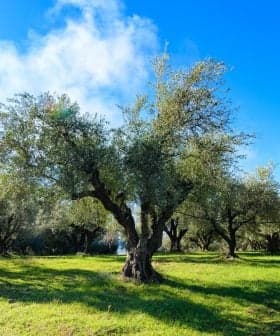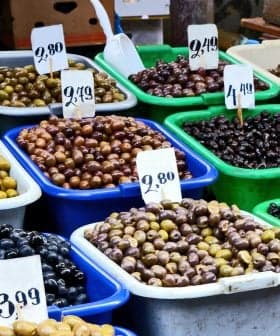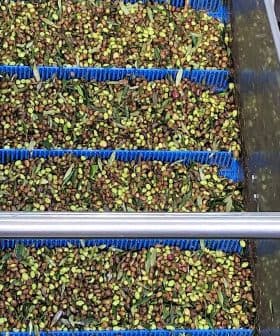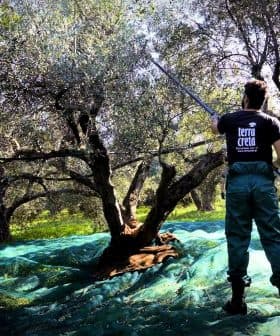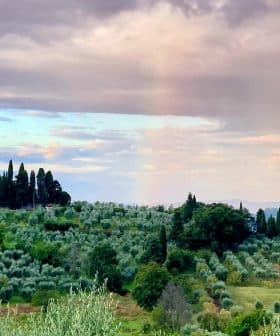Greek Olive Variety Makri Awaiting EU PDO Status
Makri is an indigenous Greek olive variety cultivated in Alexandroupoli in northeastern Greece close to the border with Turkey, a region located in the western part of the geographical and historical region known as Thrace.
An application was submitted to the European Commission on January 11 to include the Greek olive variety “Elaiolado Makris” on the EU’s list of food products with Protected Designation of Origin (PDO) status, following an eight-year-long process. The PDO status is important for producers as it guarantees quality, helps build consumer confidence, and provides a competitive advantage in European and international markets.
An application was submitted to the European Commission on January 11 to include the Greek olive variety “Elaiolado Makris” (also often called “Makri”) on the EU’s list of food products with Protected Designation of Origin (PDO) status.
Demosthenis Hatzinikolaou, president of a local agricultural olive oil cooperative, told the Athens-Macedonian News Agency (ANA), that the application was an eight-year-long process since the variety first had to be included in the National Catalog of Varieties before PDO status could be applied for on the national level. After national recognition, the application can then be submitted for EU status.
Once the application was submitted to the European Commission it was examined for “receivability” and then published in the Official Journal on January 11, 2018, in accordance with official procedures. Following publication, objections to the application can be received and examined over a period of six months.
Makri is an indigenous Greek olive variety cultivated in Alexandroupoli in northeastern Greece close to the border with Turkey, a region located in the western part of the geographical and historical region known as Thrace. This is the northern-most area of the country where olives are cultivated and a region with a particular microclimate that gives it dry summers and cold winters.
Maria Micheli of Konos told Olive Oil Times that this microclimate is integral to Makri’s terroir: “We have smooth transitions between the seasons as a seaside area and within the aura of the Thracian Sea there’s a unique microclimate,” she explained.
Producing in the same region is Niki Kelidou of Kyklopas Olive Mill who describes Makri as “a unique variety of the region that has a medium intensity and delicate fruity aromas of green banana, fresh herbaceous flowers and artichoke but also with a balance of bitterness and spice.”
Receiving a product certification designation like PDO is valuable because it’s a recognized mark of quality that guarantees an authentic product that originates in a specific geographical region. This also reinforces consumer confidence and gives producers a competitive advantage in European as well as international markets.
“The application for PDO status is important for us,” Kelidou told Olive Oil Times. “But not so much because of the obligations regarding cultivation, extraction and storage as we already satisfy these requirements. We are especially pleased that after so many awards which recognize the quality of our oil, we have drawn attention to the Makri variety and set in motion the PDO process. We sincerely hope that this will sensitize more producers in the region regarding the proper management of the olives, from the grove all the way the olive press.”
Micheli said the official recognition for Makri would be a boon for its producers: “PDO is an important recognition for us because it’s an acknowledgment of our distinct product: our olive oil. It gives us the opportunity to make it known to the public and to acknowledge the hard work that goes into producing an olive oil of great quality.”
There are three different designations for agricultural products and foodstuffs under the EU’s product certification system:
PDO (Protected Designation of Origin) is the highest designation because it vouches that a product that has been produced, processed and prepared in a certain geographical area using recognised know-how.
PGI (Protected Geographical Indication) is the “stamp” given to a product or foodstuff that is closely linked to a certain geographical area, with at least one stage of production, processing or preparation taking place there.
The third is TSG (Traditional Speciality Guaranteed) which indicates the traditional character of the product with regard to its composition or means of production.
There are already 19 registered Greek olive varieties with PDO status and a further 11 with PGI. Many of these were registered already back in 1996. Besides Makri, another application that’s in progress is the one submitted for the Greek variety Krista on July 6, 2017.



